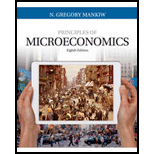
Example of adverse selection.
Answer to Problem 1CQQ
Option ‘b’ is the correct answer.
Explanation of Solution
Option (b):
Elaine, the buyer of health insurance knows more about her own health problems than the insurance company. The price of health insurance reflects the costs of an unhealthier person than an average person. So, Jerry who is healthy may observe the high price of insurance and decide not to buy it. Thus, option ‘b’ is correct.
Option (a):
Inspite of getting a health insurance, Elaine is not imperiling herself to illness. Hence, option ‘a’ is incorrect.
Option (c):
Health insurance does not signal the health issues of a person. Hence, option ‘c’ is incorrect.
Option (d):
The insurance company is not asking the parties for their health information. Hence, option ‘d’ is incorrect.
Concept introduction:
Adverse selection: Adverse selection refers to a situation where there is a lack of information existing in the market before the economic transaction takes place, thereby resulting in an undesired outcome.
Moral hazard: Moral hazard refers to changes in the behavior of people after they have entered into a transaction that makes the other party in the transaction worse off.
Signaling: Signaling is an action taken by an informed party to reveal private information to an uninformed party.
Screening: Screening refers to the action of one party in the process of finding the required skill and information of other party.
Want to see more full solutions like this?
Chapter 22 Solutions
Bundle: Principles of Microeconomics, Loose-leaf Version, 8th + MindTap Economics, 1 term (6 months) Printed Access Card
- How might adverse selection make it difficult for an insurance market to operate?arrow_forwardIf people get higher pay from their insurance than their premiums, will this increase or decrease the death rate of average person? Is this example of moral hazard or adverse selection? How will the insurance company deal with this problem ?arrow_forward
 Principles of Economics, 7th Edition (MindTap Cou...EconomicsISBN:9781285165875Author:N. Gregory MankiwPublisher:Cengage Learning
Principles of Economics, 7th Edition (MindTap Cou...EconomicsISBN:9781285165875Author:N. Gregory MankiwPublisher:Cengage Learning Principles of Macroeconomics (MindTap Course List)EconomicsISBN:9781285165912Author:N. Gregory MankiwPublisher:Cengage Learning
Principles of Macroeconomics (MindTap Course List)EconomicsISBN:9781285165912Author:N. Gregory MankiwPublisher:Cengage Learning
 Economics (MindTap Course List)EconomicsISBN:9781337617383Author:Roger A. ArnoldPublisher:Cengage Learning
Economics (MindTap Course List)EconomicsISBN:9781337617383Author:Roger A. ArnoldPublisher:Cengage Learning Managerial Economics: A Problem Solving ApproachEconomicsISBN:9781337106665Author:Luke M. Froeb, Brian T. McCann, Michael R. Ward, Mike ShorPublisher:Cengage Learning
Managerial Economics: A Problem Solving ApproachEconomicsISBN:9781337106665Author:Luke M. Froeb, Brian T. McCann, Michael R. Ward, Mike ShorPublisher:Cengage Learning





